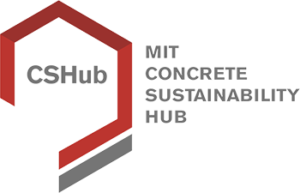SUSTAINABILITY
MIT
CONCRETE
The MIT Concrete Sustainability Hub (CSHub) was co-founded in 2009 by the Concrete Advancement Foundation and Portland Cement Association, and it remains the Foundation's most significant and strategic investment. The MIT CSHub is currently working on more than 20 projects to help the industry achieve carbon neutrality and build more sustainably and resiliently. Visit the CSHub Website for the latest updates and to view the MIT CSHub's full portfolio of research reports, briefs and tools. You can also view recordings of recent webinars on the CSHub's YouTube channel.

OTHER SUSTAINABILITY
RELATED RESOURCES,
REPORTS & GUIDES
Comparison of Cost & Energy Performance: Houses Built with ICF vs. Wood-Framed Houses was conducted by Drs. Somik Ghosh and Ben Bigelow of the University of Oklahoma’s Haskell & Irene Lemon Construction Science Division. The study was a unique opportunity to compare five different houses in the same OK neighborhood. The research team investigated material and installation costs, as well as energy performance, in a near side-by-side comparison of insulated concrete forms (ICF) and wood-frame constructed homes.
NRMCA Materials Ingredient Reporting Guidance – This report provides guidance on how ready mixed concrete producers may contribute to the credit titled LEED v4 Materials and Resources: Building Product Disclosure and Optimization - Material Ingredients.
Factors Controlling the pH of Recycled Concrete Aggregate (RCA): Executive Summary – Recycled concrete aggregate (RCA) is often used as a substitute for natural, virgin aggregate in pavement construction applications. This report examined the RCA leachate generation from stockpiles and road base applications. The Executive Summary is included on the link above and the final report and a PowerPoint presentation are also available upon request.
Reflectivity of Light Emitting Diodes and Incandescent Light on Concrete and Asphalt Pavements – This report evaluates the reflectivity of both concrete and asphalt pavements using both traditional Incandescent lighting and the newer technology of Light Emitting Diodes (LED) lighting.
Sustainable Concrete Plant Guidelines, Version 1.1 – The Guidelines form the basis for a Sustainable Concrete Plant Certification offered by the National Ready mixed Concrete Association. Please click here for more information. Additional supporting materials, including calculators and checklists, may be obtained by contacting Jennifer LeFevre.
Crushed Concrete Aggregate as Aggregates for New Concrete – This study was conducted at NRMCA's Lab and details how the proper use of crushed returned concrete can save the concrete industry $300 million annually in materials and disposal costs.
New Technology-Based Approach to Advance Higher Volume Fly Ash Concrete with Acceptable Performance – This study was conducted at NRMCA's Lab and was co-funded by the U.S. Department of Energy's Combustion Byproducts Recycling Consortium. The companion Guide for the Construction Team is also available.
Effect of Pavement Type on Fuel Consumption and Emissions in City Driving – This final report came from the University of Texas at Arlington. To receive the companion tool Roadway Fuel Consumption and Emissions Calculator, please contact Jennifer LeFevre.
"Each of us is carving a stone, erecting a column, or cutting a piece of stained glass in the construction of something much bigger than ourselves."
GET IN TOUCH
CONTACT US
Contact Us
We will get back to you as soon as possible.
Please try again later.
PERVIOUS
CONCRETE PAVEMENT
RESOURCES
Note: Pervious Concrete Materials also fall under Concrete Applications. They are included here due to their sustainability and stormwater management attributes.
Evaluation of the Effects of Deicer Chemical Methodologies on Pervious Concrete & Development of a Deicer Chemical Testing Method for Pervious Concrete – This report, conducted at Washington State University and Lamar University, evaluates deterioration impacts of deicer chemicals on pervious concrete.
An Integrated Study of Pervious Concrete Mixture Design for Wearing Course Applications – This report from the National Concrete Pavement Technology Center at Iowa State University, included funding from the Federal Highway Administration.
Performance Evaluation of In-Service Pervious Concrete Pavements in Cold Weather – This report looks at the structural and hydraulic performance as well as the durability of pervious concrete installations throughout the state of Minnesota.
Portland Cement Pervious Pavement Field Performance Investigation on Parking Lot and Roadway Pavements – This report was prepared at Cleveland State University and demonstrates the successful use of pervious concrete in freeze-thaw environments, with little maintenance required.
Compressive Strength of Pervious Concrete Pavements – This report, prepared by the Stormwater Management Academy at the University of Central Florida, examines the compressive strength of pervious concrete and the relationship between strength and permeability.
Construction & Maintenance Assessment of Pervious Concrete Pavements – This report, prepared by the Stormwater Management Academy at the University of Central Florida, details construction and maintenance issues to ensure maximum performance of pervious concrete.
Hydraulic Performance Assessment of Pervious Concrete Pavements for Stormwater Management Credit – This report, prepared by the Stormwater Management Academy at the University of Central Florida, focuses on the stormwater management properties of pervious concrete.
Pervious Concrete Research Literature Review - A list of some pervious concrete research that maybe of interest.
The Concrete Advancement Foundation does not discriminate on the basis of race, color, national origin, sex, age, or disability in its program or activities.
© All Rights Reserved | Concrete Advancement Foundation
This site is powered by Neon One
The Concrete Advancement Foundation does not discriminate on the basis of race, color, national origin, sex, age, or disability in its programs or activities.
1-888-846-7622 • 66 Canal Center Plaza, Suite 250, Alexandria, VA 22314
Full Connect With Us Flier with QR Codes to all of our Social Media Links
Sign up for our mailing list
